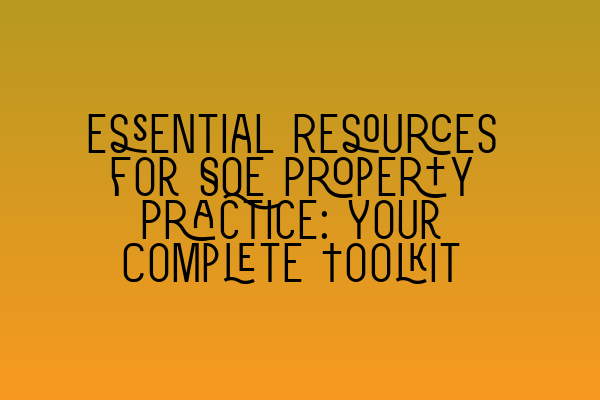Essential Resources for SQE Property Practice: Your Complete Toolkit
If you are preparing for the Solicitors Qualifying Examination (SQE) in Property Law & Land Law, it is crucial to have the right resources at your disposal. With the right toolkit, you can enhance your understanding of property law, develop practical skills, and ultimately succeed in the SQE exams.
In this blog post, we will highlight the essential resources that you should consider including in your SQE Property Practice toolkit.
1. Study Guides and Textbooks
A comprehensive study guide is a must-have resource for any aspiring property lawyer. It provides a structured approach to learning and covers the key topics, principles, and legislation relevant to property law. Some highly recommended property law textbooks include:
- Property Law: Text, Cases, and Materials – This textbook offers a detailed analysis of property law, including land law, conveyancing, leases, and more. It provides a comprehensive overview of the subject matter and includes case studies and legal precedents for better understanding.
- Land Law – Another highly regarded textbook, Land Law, focuses exclusively on the intricacies of land ownership, rights, and disputes. It delves into topics such as adverse possession, easements, covenants, and mortgages.
Remember to use these books as a reference and support your understanding by referring to relevant legal cases and statutes.
2. Online Study Materials and Courses
SQE 1 Preparation Courses and SQE 2 Preparation Courses can be highly beneficial for your SQE Property Practice. These courses are designed to provide in-depth insights into property law, covering the essential topics and addressing the specific requirements of the SQE exams. They often include interactive modules, practice exams, and feedback from experienced tutors.
Additionally, consider using online study materials such as interactive quizzes, flashcards, and practice exams. These resources offer a more engaging learning experience and help reinforce your understanding of key concepts. For SQE 1 Practice Exam Questions and SQE 1 Practice Mocks FLK1 FLK2, try our comprehensive practice resources designed specifically for the SQE exams.
3. Case Law and Legal Precedents
Property law heavily relies on case law and legal precedents. Familiarize yourself with landmark cases and judgments related to property law, as they form the foundation of legal principles and doctrines. The key cases to consider are:
- Stack v Dowden – This case focuses on the principles of quantifying beneficial interests in cohabitation cases.
- Street v Mountford – It established the test for distinguishing a lease from a license in landlord and tenant law.
- Hill and Redman’s Law of Landlord and Tenant – A comprehensive guide that explains the key principles and legalities of landlord and tenant relationships.
- Cohabitation: Law, Practice, and Precedents – A valuable resource for understanding the legal aspects of cohabitation and disputes arising in cohabitation cases.
Being able to reference relevant case law demonstrates a deep understanding of property law and can strengthen your arguments in exam answers or practical scenarios.
4. Legal Research Tools
As a property lawyer, you will frequently need to conduct legal research to support your cases or provide advice to clients. Therefore, it is essential to familiarize yourself with popular legal research tools such as Westlaw, LexisNexis, and Practical Law. These platforms provide access to an extensive range of legal resources, including case law databases, legislation, legal commentary, and precedents. Learning how to effectively navigate and utilize these tools can significantly enhance your legal research skills.
5. Practice Exam Papers and Past Papers
No preparation is complete without practicing past exam papers and simulated SQE exams. These resources allow you to familiarize yourself with the exam format, time constraints, and types of questions you may encounter. By practicing under exam-like conditions, you can improve your time management, refine your answers, and identify areas for improvement. It is recommended to attempt a variety of practice papers to ensure you are fully prepared for the SQE Property Law exams.
If you need help finding the relevant SQE exam dates, please refer to the SRA SQE Exam Dates article on our website.
In Conclusion
Building a complete toolkit for SQE Property Practice involves gathering a range of resources that support your learning and enable you to excel in the SQE exams. By investing in the right study guides, online courses, practice materials, and research tools, you can enhance your understanding of property law, develop your practical skills, and confidently tackle the challenges posed by the SQE exams.
Remember, preparation is key, and utilizing these essential resources will give you a competitive advantage. Good luck with your SQE Property Practice journey!
